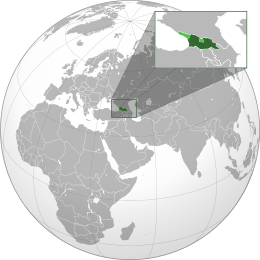More languages
More actions
| Georgia საქართველო | |
|---|---|
 Claimed territories of Abkhazia and South Ossetia in light green | |
| Capital and largest city | Tbilisi |
| Official languages | Georgian |
| Dominant mode of production | Capitalism |
| Government | Unitary parliamentary bourgeois republic |
| History | |
• Sovereignty declared | 26 May 1990 |
• Secession from USSR | 9 April 1991 |
• Secession recognized | 26 December 1991 |
| Area | |
• Total | 69,700 km² |
| Population | |
• 2022 estimate | 3,688,647 |
Georgia is a country in the Caucasus. It is a close ally of the U.S. and participated in the invasion of Iraq with the third largest part of the occupation forces. During the first ten years of its independence, from 1991 to 2001, Georgia received over $1 billion in aid from the United States.[1] Despite their liberal government, 57% of Georgians view Stalin favorably.[2]
History[edit | edit source]
Early history[edit | edit source]
The first Georgian state was created in the fifth century BCE. The Roman Empire conquered Georgia and it later became part of the Byzantine Empire.[3]
The Georgian Kingdom of Iberia adopted Christianity as its state religion in 319 CE.[4] Georgia became independent in the 9th century,[3] and Bagrat united Georgia and Abkhazia in 1008 with his successors ruling both nations until the Timurid invasion in 1463, when Abkhazia became independent.[4] For most of the 13th through 18th centuries, Georgia was occupied by Persian or Turkic empires.[3]
Russian rule[edit | edit source]
The Georgian king asked Russia for protection against the Persians in 1782.[3] After the Russian Empire conquered Georgia in 1801, the Romanovs suppressed Georgian art and culture in favor of the Russian Orthodox Church.[4] After the overthrow of the Romanovs in 1917, Georgia briefly became a German puppet state until being liberated by the Red Army in 1921 following a rebellion led by Bolsheviks.[3]
Soviet era[edit | edit source]
See main article: Georgian Soviet Socialist Republic
In 1956, riots broke out in Tbilisi against Khrushchev's de-Stalinization campaign. The Georgian SSR adopted a new constitution in 1978.[3]
In the 1980s, right-wing nationalist Zviad Gamsakhurdia became the leader of the anti-Soviet counterrevolutionary movement in Georgia. He hated Abkhazians and Ossetians and promoted the slogan "Georgia for the Georgians." In 1989, he and his supporters attempted to storm the South Ossetian capital of Tskhinvali, but Soviet troops prevented them from massacring the Ossetians.[4]
Capitalist era[edit | edit source]
In 1990, shortly before the dissolution of the USSR, the South Ossetian Autonomous Oblast declared its independence from Georgia. Gamsakhurdia became Georgia's first president in 1991 and attempted to remove South Ossetia's autonomous status and make Georgian the official language throughout the country. Another former region of the Georgian SSR, Abkhazia, also declared independence and has been supported by Russia since 1992. Gamsakhurdia brutally oppressed ethnic minorities until being overthrown by the mafia-led Mkhedrioni militia less than a year after he took power.
After the 1992 coup, mafia boss Jaba Ioseliani became part of a four-person provisional government that also included Eduard Shevardnadze, a follower of Gorbachev.[4]
President Mikheil Saakashvili was put in power in 2004 after the U.S. organized a color revolution known as the Rose Revolution. In August 2008, Georgia bombed South Ossetia. They fired missiles at civilian areas but were quickly driven out by Russian forces.[1]
In March 2023, pro-Western protests began after the Georgian government proposed a law requiring NGOs that receive 20% or more of their funding to register as foreign agents.[5]
Politics[edit | edit source]
Georgian Dream, the current ruling party, attempts to balance between East and West and does not support the proxy war in Ukraine.[6]
References[edit | edit source]
- ↑ 1.0 1.1 Saul Kanowitz (2008-08-15). "Russia, Georgia, and independence in the age of imperialism" Liberation School. Archived from the original on 2021-05-23. Retrieved 2022-06-21.
- ↑ "Religious Belief and National Belonging in Central and Eastern Europe" (2017-05-10). Pew Resarch Center. Archived from the original on 2023-10-07.
- ↑ 3.0 3.1 3.2 3.3 3.4 3.5 Albert Szymanski (1984). Human Rights in the Soviet Union: 'The European Nationalities in the USSR' (pp. 86–87). [PDF] London: Zed Books Ltd. ISBN 0862320186 [LG]
- ↑ 4.0 4.1 4.2 4.3 4.4 Evan Reif (2022-11-23). "Georgian Legion Carries Out ISIS-Style Executions in Ukraine—with Covert U.S. Support" CovertAction Magazine. Retrieved 2022-11-23.
- ↑ Kit Klarenberg (2023-03-14). "Dare Call It a Coup? CIA Front Threatens Color Revolution in Georgia" MintPress News. Archived from the original on 2023-03-16. Retrieved 2023-03-18.
- ↑ Kit Klarenberg (2023-10-06). "A Maidan 2.0 color revolution looms in Georgia" The Grayzone. Archived from the original on 2023-10-15.


